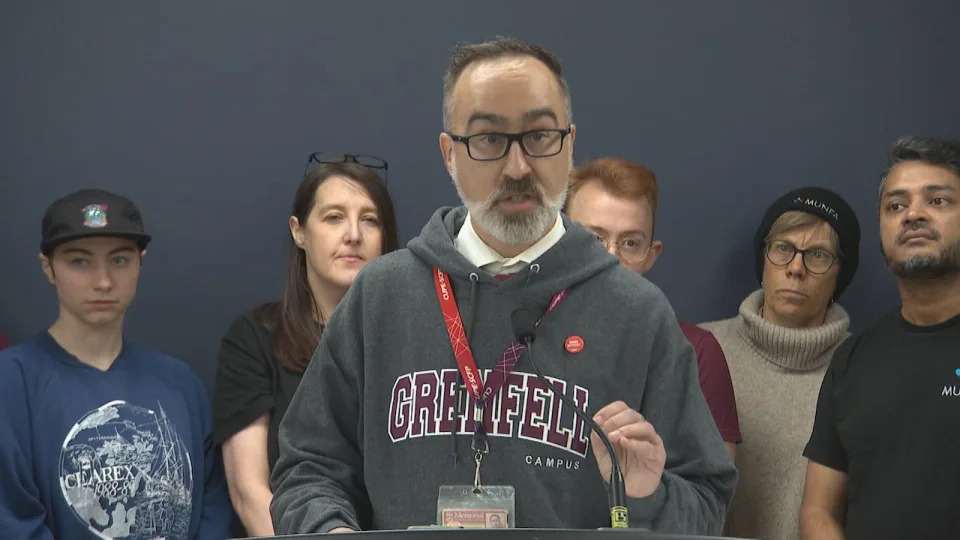NEW BRUNSWICK
CBC
Tue, September 24, 2024

MUNSU director of external affairs Nicolas Keough says students are fed up with plummeting student debts and rising costs of living. (Darryl Murphy/CBC - image credit)
Memorial University student union representative Nicolas Keough says students are fed up with spiking student debts and the rising cost of living. He was part of a group of students, faculty and union leaders demanding that the province halt funding cuts. (Darryl Murphy/CBC)
Students, faculty members and labour unions demanded an end to budget cuts Tuesday amidst soaring student debt and crumbling infrastructure at Memorial University's St. John's campus.
Student and faculty leaders gave speeches at a podium on campus pleading with the Newfoundland and Labrador government to halt cuts and restore funding to Memorial University. Their demands come three years after the province moved to significantly hike tuition costs for incoming students.
The group launched the campaign, called FundMUN, alongside CUPE and NAPE members who represent MUN's staff.
At a press conference, speakers from MUN's student union, MUN's faculty association and CUPE 1615 outlined the effects of budget reductions on students, staff and the institution itself.
"Simply put, all of us [have] had enough," said Nicolas Keough, Memorial University Students' Union director of external affairs.
"Our campuses are crumbling around us," he said. "Tuition fees are increasing at alarming rates to try to make up the funding."
The coalition also launched a website where students, staff, and members of the public can directly email elected officials, including their MHA, to inform how funding cuts have impacted them.
A call to action
Lisa Moores, vice-president external for the Memorial University of Newfoundland Faculty Association and an associate professor of counselling, highlighted the role Memorial University plays academically, socially and economically in the province.
"Our university was raised as a memorial to the fallen in the Great Wars," she said.
She said MUN's legacy is to provide students wirth opportunities that would have otherwise been out of reach.

MUNFA vice-president external, Lisa Moores says she constantly hears from her colleagues about the stress of working in an institution that's been whittled away for a decade.
Lisa Moores of MUN's faculty association says she constantly hears from her colleagues about the stress of working in an institution that's been whittled away for a decade. (Darryl Murphy/CBC)
Moores says that a decade of funding cuts has reduced the university's ability to function adequately.
"With the exception of our medical school, funding to MUN has been cut by a staggering 46 per cent since 2013," Moores said, adding that continued cuts would do a disservice to both the students and everyone in the province.
Keough says tuition fees have increased 135 per cent for domestic students and 74 per cent for international students since 2021, and the enrolment number is dropping as well.
"Students are barely holding on, with skyrocketing rent and rising costs of living adding to the burden," Keough said.
Moores echoed these concerns, saying Newfoundland and Labrador only has one university, and it deserves a university that serves the public good.
"This cannot happen if funding cuts continue," said Moores.
'You must do the right thing'
Bill Kavanaugh, president of CUPE Local 1615, which represents over 700 administrative, technical, and support staff at MUN, also spoke at the event. Kavanaugh painted a grim picture of the crumbling infrastructure and the impact of cuts on staffing levels.
Memorial's facilities have been suffering from a backlog of deferred maintenance needs, estimated at $481 million, says Kavanaugh, noting that funding for the university's deferred maintenance program was cut in 2018.

Bill Kavanaugh is the president of CUPE local 1615. He says the Premier should reflect on his university experience as a MUN alumni when he makes decisions at the next provincial budget.
Bill Kavanaugh is the president of CUPE local 1615. He says the premier should reflect on his university experience as a MUN alumnus when he makes decisions at the next provincial budget. (Darryl Murphy)
Kavanaugh says the degradation of Memorial's campus affects staffing levels and labour conditions as well.
"This is where we work, study, and socialize," said Kavanaugh.
The Facilities Condition Index, or FCI, is a standard tool, ranging from 0-10 per cent, the latter being poor. This is used to measure the conditions of campus buildings at MUN.
Kavanaugh says the university fails to reach its goal of FCI 12 per cent.
"It's not hyperbolic when we say that our campuses are crumbling around us," said Kavanaugh. "They are."
"We're calling on you, Premier Furey, to do the right thing," he added.
"Sit down with us, the students, and the workers, and develop a concrete plan to restore funding to our university.... Anything short of that is a disservice to our university's legacy, to our province, and to our people."
Funding displaced, not cut: Furey
Premier Furey told reporters Tuesday that after discussions with MUN's former president, his government decided to give money to students instead of providing MUN with a "general pocket" of cash that can be spent on different projects.
"The money wasn't cut, it was displaced," said Furey.
He also said the university has a structural governance issue which should be dealt with from a fiscal point of view.
Memorial University itself alluded to its diminished funding, however.
"Our priority is ensuring that Memorial can continue to fulfil its teaching, research and public engagement mandate within the context of a constrained provincial budget and multi-year reductions in the university's operating grant," said Chad Pelley, a spokesperson for Memorial University, in an emailed statement to CBC News.
"The challenges associated with this are a part of our ongoing conversations with the provincial government."
No comments:
Post a Comment